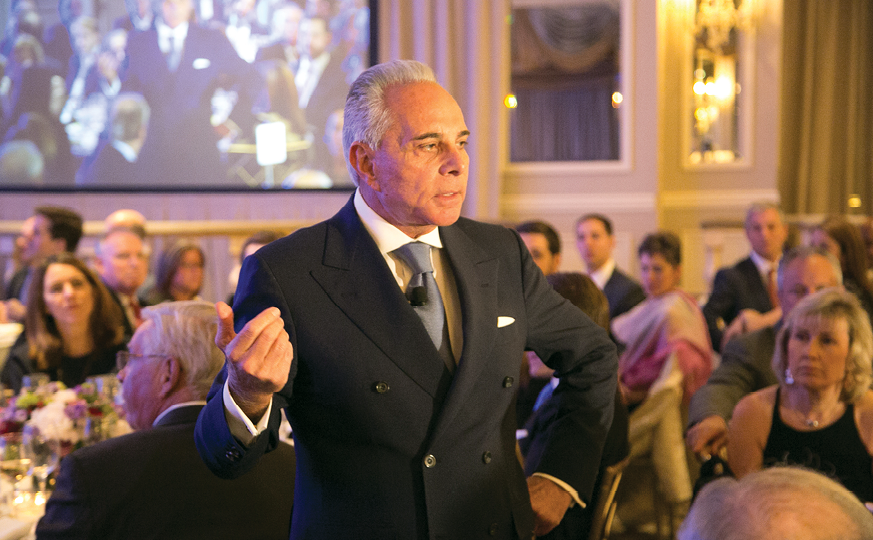- Home
- Media Kit
- Current Issue
- Past Issues
- Ad Specs-Submission
- Ad Print Settings
- Reprints (PDF)
- Photo Specifications (PDF)
- Contact Us


![]()
ONLINE

Transforming CASA
Editors’ Note
Joseph J. Plumeri, Senior Advisor to Kohlberg, Kravis, Roberts & Co. and Vice Chairman of First Data Corp., was elected to his current post in April of 2017. Plumeri has been on the CASA board for 20 years. He has been Chair & CEO of Willis Group Executives, and a leader of First Data and other global corporations. Before joining Willis, he was CEO of Citibank North America, Chairman and CEO of Travelers Primerica Financial Services, Vice Chairman of the Travelers Group, and President and Managing Partner of Shearson Lehman Brothers. In 2015, Plumeri published his first book, a national best seller, The Power of Being Yourself: A Game Plan for Success – by Putting Passion into Your Life and Work. In the book, he offers simple yet profound guidance on how to stay positive, motivate others and achieve success in life and work.
Organization Brief
The National Center on Addiction and Substance Abuse (centeronaddiction.org) is a national nonprofit research and policy organization focused on improving the understanding, prevention and treatment of substance use and addiction. Founded in 1992 by former U.S. Secretary of Health, Education, and Welfare, Joseph A. Califano, Jr., its interdisciplinary experts collaborate with others to promote effective policies and practices. CASA conducts and synthesizes research, informs and guides the public, and evaluates and improves healthcare. Increasingly, CASA is taking steps to put their research and recommendations into concrete action through programs and advocacy efforts intended to make an impact in ending the addiction epidemic in our nation.

The National Center on Addiction and Substance Abuse’s
Executive Chair Joseph J. Plumeri energizes the crowd with his
impassioned remarks at the organization’s 25th Annual Gala.
Where does CASA stand today and what are your priorities for the organization?
The organization is well-respected and its founder, Joseph A. Califano Jr., was renowned for all the great work he did in the Johnson Administration.
He founded CASA mostly as a think tank, getting grants to study all kinds of addictions. The research would be documented in a report and distributed. These publications contained extensive recommendations for action, but it would be left up to someone else to do something about it.
After 25 years of great research, if we look at the statistics, addiction has gotten worse; it’s obviously the number one killer in this country. If we take accidents and guns, which are big issues in this country, and you add them together, it still doesn’t equal the number of people killed by addiction. One hundred seventy-five people per day die of a drug overdose. This is how big of a problem it is.
I’m trying to transform CASA from a think tank to a do tank because there is no leadership in this country when it comes to dealing with addiction. There is no sense of urgency that we need to do something to stop these deaths. We don’t see people marching against addiction the way they are marching against guns or for MeToo – two causes that deserve attention. We don’t see people carrying signs that say “No more drugs.” Why is that? It’s because people have not raised addiction to the level of urgency it deserves, and because the stigma around addiction leads to a lack of compassion.
If I said that 175 people were going to die tomorrow of Ebola, everything would stop and there would be a national emergency. Someone has to raise the level of urgency and compassion around addiction, and create an understanding of what it has done to our society and culture, and how to stop it. This is exactly what we are now beginning to do at CASA – ignite a sense of urgency and compassion, and lead by example in showing people the actions that need to be taken in order to end this epidemic.
If we look at every facet of society – crime, the environment, education, quality of life, productivity – all those issues are affected by drugs. People may go to work and not be as productive as they might have been because they’re worried about someone in their family who is addicted or because they’re coming to work high themselves.
Drug use in schools is rampant – kids are vaping marijuana constantly and now we want to legalize pot because it’s an economic issue. Someone has convinced people that it is okay to do that, but what they don’t talk about is how drug use impacts our kids.
As a man who has lost his son to addiction, I’m upset with the stigma associated with it. That is why I talk about it so openly.
The statistics are so overwhelming, but someone needs to stop this. I look at the government’s approach and it’s a joke – there have been three drug czars since Donald Trump became president, one of whom was a 24 year old who was temporarily put in charge.
There was an opioid commission that had a lot of suggestions, none of which, to my knowledge, have been implemented. If the government isn’t going to lead the way, this will only get worse.
Some states are affected in a greater way than others. When I speak with some politicians whose states aren’t affected as greatly, they don’t care enough to do much.
Many families don’t know what to do with their children who are getting high every day. Also, if a parent says they need help, then people may think they’re a bad parent, and that stigma makes it harder for parents to get the resources they need.
The new CASA is not only going to tackle these issues, but it will be very loud about the way it does things. Leaders need to stand for something and we want to stand for creating a movement to end addiction.
Nineteen million people have cancer so people wear cancer pins and football teams wear pink uniforms. This is terrific, but addiction affects 40 million people and yet there is little attention paid to it. That is the problem. I’m trying to rectify this with the new CASA.
I’m very passionate about this and I plan to fight the good fight because it’s going to get worse.
When the numbers are so clear, why isn’t there a uniform voice demanding change?
There is a total lack of leadership. There is none at the federal level. Jeff Sessions gave a speech where he said he thinks all drug addicts should be thrown in jail, as if it’s their fault.
My son didn’t die because he chose to have a disease. He didn’t choose to get addicted, but the government doesn’t have a clear understanding of what this is about.
Politicians look at polls, and if the issue is at the top f the polls, they address it; if not, they don’t mess with it. Unfortunately, addiction is lower on the scale. If one is in Vermont, Ohio or New Hampshire, where things are bad, then things get done.
In addition, the lobbyists for pharmaceutical companies, who helped create this mess, have a lot of money.
Attempts to limit new prescription opioids for pain haven’t gone far enough. I had an operation recently and I was given 30 Oxycontin. I didn’t take one, because Extra Strength Tylenol is fine with me. However, there should have been some restriction on how much I was prescribed. There should also be laws regulating how much pharmaceutical companies can produce.
The issues of illegal drugs coming into the country from China should be addressed. Oxycontin, Vicodin, and Percocet are very bad, but if we add Fentanyl to that, it’s 100 times worse. Kids are still popping pain pills, thinking that they are safer than heroin, and now they are popping “fenty” pills from China, thinking those are safe too.
There is too much debate and too little action. At the last CASA gala, I asked the audience how many people had been to a cancer gala to raise money to fight the disease. Every person raised their hand. I then asked who had been to an addiction gala before. Nobody raised their hand.
We have gotten to the point where there is awareness about addiction now but still no sense of urgency. Americans don’t do anything unless there is an emergency.

Joseph J. Plumeri addresses New York parents at
CASA’s Family Day event at Dylan’s Candy Bar on September 25th, 2017.
Is there a role that businesses and corporations should be playing in this effort?
Yes. Many businesses require people to take a drug test before being hired. However, most companies don’t do anything to make sure those employees remain okay while they are working there. I want to engage the business community and have them become sponsors of programs for their own employees, because that is where they can have immediate impact.
They can set up an anonymous hotline or online access where people can ask questions about themselves or their families. They can offer better benefits to take care of people who are sick with addiction, or their family members. There is no metric on how much productivity is lost because of this problem, but the business community should be leading the charge on this because they have the venues where people work.
Parents can also play a big part. Although there are drugs all around in schools, no one is marching against this. School boards are not held accountable because, if they admit they have a drug problem in their school, it might be perceived that they are doing a bad job and impact enrollment. All these issues and contradictions are things someone has to blow up in a positive way and ask what is being done.
After all, addiction is a terrible disease that impacts nearly all facets of our culture and country. By preventing and ending this completely treatable disease, we will also be doing a lot to help improve many of the other challenges and problems we see in society.
As someone who’s known for fixing companies, does your business skill set translate to the nonprofit world?
Yes, just like leading a for-profit company, you need to have imagination and vision. When I go into a company, I always believe that I can convince employees to imagine it could become a better company that they could be proud of.
From imagination comes a vision. I will never forget the 9/11 report that was titled, A Failure to Imagine. It blew my mind that, if someone could have imagined that those two towers could come down, maybe they would have done something about it.
Creating change requires a big dose of compassion and an understanding of the mission and purpose. Companies don’t turn around because they turn numbers around; they turn around because of these intangible things like purpose, which gives the company meaning and instills life in people.
In the absence of that, there is no turnaround. One can’t just cut costs and expect things to get better; you need to change the company’s purpose. Similarly, unless this country begins to develop a clear purpose around combating the impact of drugs like opioids, cocaine and heroin on their children, things won’t get better. Unless we utilize all the channels and bridges that are necessary for this to happen, things will get worse.
Our purpose needs to be one that leads to parents not having to bury their children – I did it, and it’s the worst thing in the world, and we all want our kids to lead a full life. My son didn’t lead a full life. If this country embraces this same purpose, we can turn it around.•